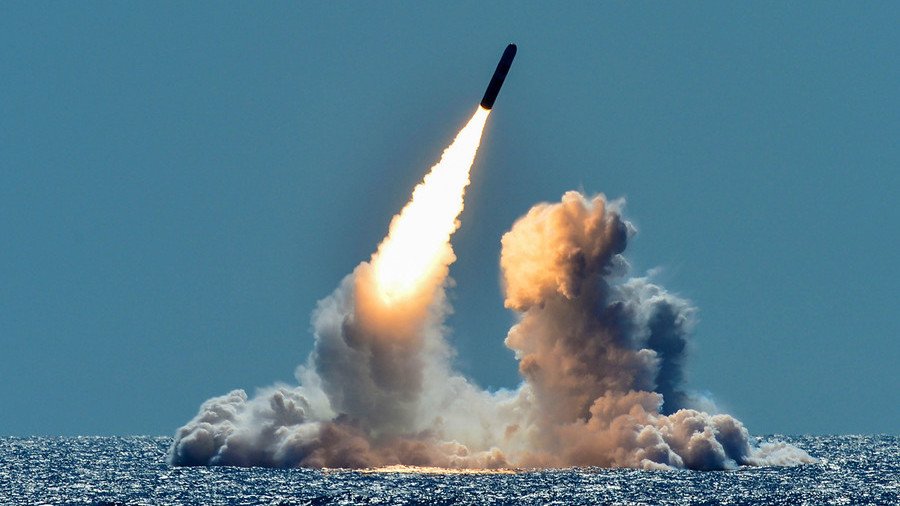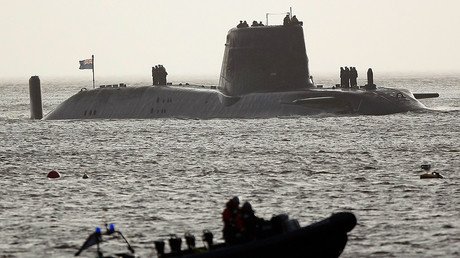Trident nuclear subs: MoD faces £6bn funding gap

The British government is on course to dip further into a £10 billion ($13.5 billion) contingency fund set aside for the renewal of its nuclear-deterrent Trident submarines, the National Audit Office warns.
Under its first nuclear review in a decade, the National Audit Office’s (NAO) Defence Nuclear Enterprise report identified a hole of £6 billion for the program, which includes the procurement of new nuclear submarines, propulsion systems, missiles, and warheads.
In the 10 years up to 2028, the NAO says the Ministry of Defence faces a £2.9 billion “affordability gap” in its spending plans, on top of a further £3 billion in savings that the MoD has already said it needs to make in its nuclear domain.
The report said that it hopes a MoD mini-defense review, due to report in July, will suggest ways to make up for the shortfall.
Figures provided by the NAO in its report put the UK’s nuclear spending over the next decade at £22.9 billion for the Astute-class, Vanguard-class, and Dreadnought-class submarines; £13.4 billion for weapons and warheads; £6.9 billion for propulsion; and £6.7 billion on costs associated with decommissioning old nuclear boats, and other liabilities.
All of the MoD’s nuclear assets over the next 10 years are expected to cost a total of $50.9 billion.
Development of four Dreadnought-class subs – the vessels that will eventually carry the UK’s Trident II D5 nuclear missiles – is expected to cost the exchequer a total of £31 billion, with BAE Systems and Rolls Royce the lead contractors on the project.
The report also found that construction of two Astute-class submarines, the subs that will protect the four-strong nuclear-armed fleet, had been delayed by two years in an effort to cut costs.
It is understood, according to The Times, that such delays, while saving money in the short term, increase the total purchase price of a piece of equipment.
READ MORE: More F-35s vs the Eurofighter: MoD decisions as funding gap row grows
Funding for the seventh and final Astute-class submarine, to be named HMS Agincourt, was announced by Defence Secretary Gavin Williamson last week.
A £10-billion contingency fund has also been set up, but any withdrawals from the fund need to be approved by the treasury.
That contingency well was tapped for the first time during this financial year, with £600 million being approved by Chancellor Mark Hammond.
The report also highlighted a lack of qualified personnel for the program, with the NAO identifying hundreds of staff shortages in areas including finance, commercial, and nuclear marine engineering.
Among the positions needed are 56 posts within the new Defence Nuclear Organisation, which oversees the UK’s nuclear enterprise, as well as 337 specialized jobs across “across seven military nuclear specialisms.”
READ MORE: SNP MPs blast Trident nuclear program ‘white elephant’ after warning on MoD funding gap
Commenting on the report, the Scottish Campaign for Nuclear Disarmament said the government’s Trident renewal program was “in a state of chaos,” charging the MoD with “significantly downplaying the true cost & time needed to finalise it.”
Meg Hillier MP, who chairs the Public Accounts Committee, said: “The budget pressures on the MoD’s nuclear programme are significant.”
“The department will need to make some critical decisions to get the programme on track financially,” she added.
However, the MoD assured The Independent that: “Not only is the nuclear deterrent our ultimate defence from the world's most extreme threats, but it is a true national endeavour which supports thousands of British jobs."
“The Dreadnought programme is one of the most complex engineering programmes ever undertaken by the UK and the NAO's report highlights our position that it is on track to be delivered on schedule and within the original estimated cost.”
Think your friends would be interested? Share this story!















